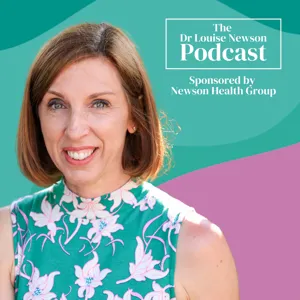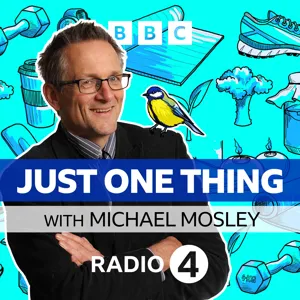Podcast Summary
The Importance of Addressing Menopause and Cardiovascular Health: This podcast episode highlights the need for more evidence-based treatment for menopausal women, particularly regarding cardiovascular health. Dr. Louise Newson and Professor Marco Gambachani discuss the significance of menopause research and treatment, emphasizing the importance of continued advocacy and education to improve care for all women.
Learning from this podcast episode is the importance of addressing the underrecognized and undertreated issue of menopause, particularly in relation to cardiovascular health. Dr. Louise Newson, a GP and menopause specialist, emphasizes the need for more evidence-based treatment for menopausal women in the UK and beyond. Her guest, Professor Marco Gambachani, shares his background in menopause research and treatment, highlighting the significance of this field due to the large number of women entering menopause in the coming years. Despite progress, there is still much work to be done to ensure adequate care for menopausal women. Gambachani's experience in Italy, where only a minority of women are taking HRT, underscores the need for improvement in many countries. Overall, this conversation emphasizes the importance of continuing research, education, and advocacy to improve menopause care for all women.
A physician's passion for women's health during and after menopause: Every woman (and likely every man) should get a bone density scan to prevent debilitating effects of osteoporosis, yet it's often overlooked in healthcare
The speaker, a physician, has had a long-standing interest in women's health during and after menopause. This interest began when she studied neuroendocrinology and the effects of menopause on the body, including hot flashes, cardiovascular disease, and osteoporosis. She was the first in Italy to use a bone density meter and was fascinated by the data it provided. When she opened her menopause and well-being center four and a half years ago, she prioritized getting a bone density machine because she strongly believes that every woman (and likely every man) should have a bone density scan due to the high prevalence of osteoporosis compared to other common diseases like heart disease, breast cancer, and dementia. She has seen firsthand the debilitating effects of osteoporosis, including pain, difficulty digesting food, breathing problems, and inability to hug loved ones. Despite this, she feels that osteoporosis is often overlooked and underdiscussed in healthcare.
Understanding Hormones' Impact on Bone Health: Regular bone density screenings starting around menopause help prevent debilitating fractures and improve overall well-being by addressing bone health and early detection.
Hormones play a significant role in bone health, and being aware of this fact is crucial for prevention. Hormonal changes, particularly during menopause, can lead to conditions like osteoporosis and osteopenia. These conditions are often diagnosed through bone density scans, such as a DEXA scan. The importance of early detection cannot be overstated, as many fractures occur years before symptoms appear. Preventative measures include regular bone density screenings, ideally starting around the time of menopause. The consequences of not addressing bone health can be severe, leading to debilitating fractures and a decreased quality of life. Furthermore, it's essential to understand that bone health is not just about the bones themselves but also about the intervertebral discs, which act as shock absorbers. By focusing on bone health and early detection, we can significantly reduce the risk of fractures and improve overall well-being.
Hormonal changes during menopause increase risk of bone loss and fractures: Many women with osteoporosis or at risk miss effective prevention/treatment due to physician hesitance to prescribe HRT, while North American Menopause Society recommends hormones as most effective agents for preventing/treating osteoporosis in postmenopausal women.
During menopause, women experience hormonal changes that can lead to bone loss and increased risk of vertebral fractures. This is particularly concerning for women who undergo early menopause or have their ovaries removed without hormone replacement therapy. Despite evidence showing that HRT can prevent and treat these fractures, many physicians in the UK are hesitant to prescribe it due to unfamiliarity with its use and concerns over side effects. As a result, many women with osteoporosis or at risk of developing it are missing out on effective prevention and treatment. The North American Menopause Society recommends hormones as the most effective agents for preventing and treating osteoporosis in postmenopausal women. However, the use of bone-specific agents like phosphonates in younger women is not supported by data. It's essential that healthcare providers are educated on the benefits and risks of HRT and other treatments to ensure women receive appropriate care for their bone health during menopause.
Understanding the Role of HRT for Women's Health: HRT, particularly estrogen and testosterone, supports bone, joint, muscle health, and collagen production in aging adults. Risks are generally low, and transdermal options offer ease of use and tailored dosing.
There is a need for more education and discussion around the use of hormone replacement therapy (HRT) for women, particularly those suffering from menopause and fibromyalgia. The safety and effectiveness of HRT, including transdermal options, for treating symptoms and preventing conditions like osteoporosis and sarcopenia is important to understand. HRT, specifically estrogen and testosterone, plays a crucial role in supporting bone, joint, muscle health, and collagen production for both men and women as they age. Despite some concerns, the risks associated with HRT are generally low, and transdermal options may be preferable for certain patients due to ease of use and tailored dosing. Overall, healthcare professionals should consider the benefits and risks of HRT for their patients and engage in ongoing dialogue with aromatologists and other experts to make informed decisions.
Discussing the complex relationship between HRT and heart disease: Recent research suggests that HRT, specifically estrogen therapy, can help prevent cardiovascular disease in women. However, the role of hormones in reducing the risk of chronic diseases is often overlooked in discussions with healthcare professionals.
Hormone replacement therapy (HRT) can help improve bone density, reduce the risk of osteoporosis, and have other beneficial effects for women's health. However, the discussion around HRT and its impact on heart disease, cardiovascular disease, and dementia is complex. For decades, it has been known that the longer a woman is without her hormones, the greater the risk of these conditions. Yet, the evidence regarding taking HRT to reduce these risks is not clear-cut due to various types of HRT and groups of women being studied. It is concerning that cardiologists and health organizations often discuss women's increased risk of these conditions after menopause without mentioning the role of estrogen or hormones. Recent research suggests that HRT, specifically estrogen therapy, can help prevent cardiovascular disease in women. It is important for healthcare professionals to discuss the definitions and indications of hormone therapy in relation to the prevention of chronic diseases, including cardiovascular disease in women.
Hormone replacement therapy: Finding the right balance: Hormone replacement therapy can improve menopause symptoms and long-term health, but it's crucial to find the right dose and obtain hormones from a trusted source to minimize risks.
Hormone replacement therapy (HRT) can be beneficial for managing symptoms during menopause and optimizing future health. However, it's important to note that the right dose is crucial, as hormones are powerful substances. A U-shaped relationship exists between DHA levels and the risk of chronic diseases like cancer and cardiovascular disease, with the best levels being around 200. Prescribing hormones should be done with caution, and patients should be informed of the risks and benefits. It's essential to obtain hormones from a trusted source rather than buying them online, as many supplements may not be effective or even risky. The goal is to maintain hormones at a physiological level, allowing for symptom improvement and long-term health optimization. Despite recent debates, HRT remains a valuable tool for managing menopause and improving overall health.
Starting HRT around menopause is crucial for improving quality of life and preventing chronic diseases: Starting HRT early can prevent chronic diseases like osteoporosis and heart disease, improving overall health and quality of life. Advocate for proper access to necessary medications.
Starting hormone replacement therapy (HRT) around the time of menopause is crucial for both improving quality of life and preventing chronic diseases such as osteoporosis and cardiovascular disease. The earlier HRT is started, the more effective it is in preventing these conditions. However, access to necessary medications can be a challenge, as some products are not available or distributed properly, making it important to advocate for their availability. Additionally, there is evidence supporting the benefits of HRT for reducing the risk of osteoporosis, heart disease, and other chronic conditions in younger women experiencing menopause symptoms.
Improving women's quality of life with Hormone Replacement Therapy: HRT enhances overall well-being, reduces symptoms, prevents chronic diseases, maintains career performance, and improves sex life for women in their 50s and beyond.
That Hormone Replacement Therapy (HRT) plays a crucial role in improving the quality of life for women, particularly when started at a younger age. This is important because reducing symptoms and enhancing overall well-being not only improves day-to-day functioning but also prevents chronic diseases. Furthermore, HRT can help women maintain their performance in their careers and enjoy a satisfying sex life, making it a valuable consideration for women in their 50s and beyond. By addressing symptoms early and maintaining optimal hormonal balance, women can improve their overall health and well-being, and prevent long-term health issues. HRT is not just about vanity or cosmetic benefits, but rather about enhancing women's lives in meaningful ways. So, if you're a woman considering HRT, remember that it's about improving your quality of life, maintaining your performance, and ensuring a satisfying sexual experience.





